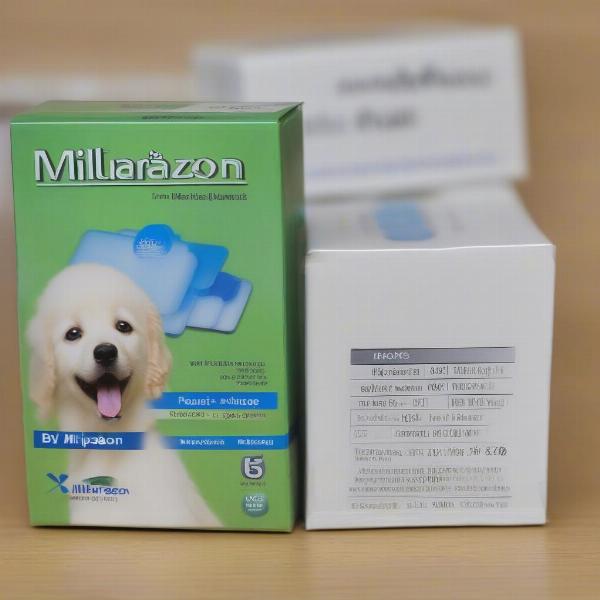Milprazon for dogs 5-25kg is a broad-spectrum wormer that effectively treats various common intestinal worms in dogs weighing between 5 and 25 kilograms. This comprehensive guide will cover everything you need to know about using Milprazon for your dog, from understanding its benefits to potential side effects and proper administration.
Understanding Milprazon for Dogs
Milprazon tablets for dogs contain two active ingredients: milbemycin oxime and praziquantel. Milbemycin oxime targets roundworms, hookworms, whipworms, and heartworms (prevention), while praziquantel effectively eliminates tapeworms. This dual-action formula makes Milprazon a convenient and reliable choice for protecting your furry friend from these common parasites. The 5-25kg dosage is specifically formulated for dogs within that weight range, ensuring they receive the correct amount of medication.
 Milprazon Tablets for Dogs 5-25kg
Milprazon Tablets for Dogs 5-25kg
Why is Worming Important for Dogs?
Intestinal worms can cause a range of health problems in dogs, from mild discomfort to severe illness. Symptoms of worm infestations can include vomiting, diarrhea, weight loss, a pot-bellied appearance, and a dull coat. Regular worming is crucial to protect your dog’s health and prevent the spread of these parasites to other animals and even humans. Puppies are particularly vulnerable to worms and require a more frequent worming schedule.
Administering Milprazon for Dogs 5-25kg
Milprazon tablets are easy to administer. They are flavored to make them more palatable for dogs. You can give the tablet directly to your dog or mix it with their food. Make sure your dog consumes the entire dose. It’s essential to follow the dosage instructions provided on the packaging or by your veterinarian. The general recommendation is one tablet per 5kg body weight. However, always consult your vet before administering any medication, especially if your dog has any underlying health conditions.
Potential Side Effects of Milprazon
Milprazon is generally safe for dogs. However, like any medication, it can potentially cause side effects. These are usually mild and transient, including vomiting, diarrhea, loss of appetite, and lethargy. In rare cases, more serious reactions like allergic reactions or neurological symptoms can occur. If you notice any unusual symptoms after giving your dog Milprazon, contact your veterinarian immediately.
Preventing Worm Infestations in Dogs
While regular worming with Milprazon is essential, preventative measures can also help reduce the risk of worm infestations. These include:
- Regular fecal examinations: Bring a stool sample to your veterinarian for analysis at least once a year.
- Proper hygiene: Clean up your dog’s feces immediately, especially in public areas.
- Flea control: Some tapeworms are transmitted through fleas, so regular flea prevention is crucial.
- Avoiding contact with infected animals: Prevent your dog from interacting with stray or infected animals.
Conclusion
Milprazon for dogs 5-25kg is a valuable tool in protecting your dog’s health from the harmful effects of intestinal worms. By following the recommended dosage and incorporating preventative measures, you can ensure your dog remains happy, healthy, and parasite-free. Remember to consult your veterinarian for personalized advice on worming your dog and addressing any concerns you may have.
FAQ
- How often should I give my dog Milprazon? Generally, every three months. However, consult your vet for a tailored worming schedule.
- Can I give Milprazon to pregnant or lactating dogs? Consult your veterinarian before giving Milprazon to pregnant or lactating dogs.
- What should I do if my dog vomits after taking Milprazon? Contact your veterinarian for advice.
- Can Milprazon prevent heartworm disease? Milprazon can help prevent heartworm disease, but it does not treat existing infections.
- Where can I buy Milprazon for dogs? Milprazon is available at veterinary clinics and some pet stores.
- Is Milprazon safe for all dog breeds? Generally, yes. However, always consult your vet before giving any new medication to your dog.
- What are the signs of worms in dogs? Signs can include vomiting, diarrhea, weight loss, a pot-bellied appearance, and a dull coat.
ILM Dog is your trusted source for expert dog care advice. We offer a wealth of information on everything from breed selection and health care to training, nutrition, and grooming. Our aim is to empower dog owners with the knowledge they need to provide the best possible care for their furry companions. For further assistance and expert guidance, please contact us at [email protected] or call us at +44 20-3965-8624. Visit ILM Dog for more valuable resources and tips on caring for your beloved dog.